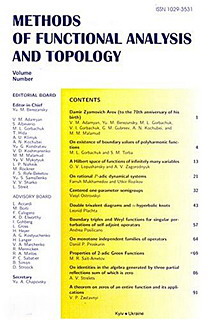Vol. 18 (2012), no. 4
Realizations of stationary stochastic processes: applications of passive system theory
MFAT 18 (2012), no. 4, 305-331
305-331
In the paper, we investigate realizations of a $p$-dimensionalregular weak stationary discrete time stochastic process $y(t)$ asthe output data of a passive linear bi-stable discrete timedynamical system. The state $x(t)$ is assumed to tend to zero as ttends to $-\infty$, and the input data is the $m$-dimensional whitenoise. The results are based on author's development of the Darlington method for passive impedance systems with losses of thescattering channels. Here we establish that considering realizationfor a discrete time process is possible, if the spectral density $\rho(e^{i\mu})$ of the process is a nontangential boundary value ofa matrix valued meromorphic function $\rho(z)$ of rank $m$ withbounded Nevanlinna characteristic in the open unitdisk. A parameterization of all such realizations is given and minimal,optimal minimal, and *-optimal minimal realizations areobtained. The last two coincide with those which are obtained by Kalman filters. This is a further development of the Lindquist-Picci realization theory.
One remark concerning double-infinite Toda lattice
MFAT 18 (2012), no. 4, 332-342
332-342
We propose the power moment approach to investigation of double-infinite Toda lattices, which was contained in author's article [6]. As a result, we give the main theorem from [6] in a more effective form.
Trace formulae for graph Laplacians with applications to recovering matching conditions
Yulia Ershova, Alexander V. Kiselev
MFAT 18 (2012), no. 4, 343-359
343-359
Graph Laplacians on finite compact metric graphs are considered under the assumption that the matching conditions at the graph vertices are of either $\delta$ or $\delta'$ type. In either case, an infinite series of trace formulae which link together two different graph Laplacians provided that their spectra coincide is derived. Applications are given to the problem of reconstructing matching conditions for a graph Laplacian based on its spectrum.
On self-adjontness of 1-D Schrödinger operators with $\delta$-interactions
I. I. Karpenko, D. L. Tyshkevich
MFAT 18 (2012), no. 4, 360-372
360-372
In the present work we consider the Schrödinger operator $\mathrm{H_{X,\alpha}}=-\mathrm{\frac{d^2}{dx^2}}+\sum_{n=1}^{\infty}\alpha_n\delta(x-x_n)$ acting in $L^2(\mathbb{R}_+)$. We investigate and complete the conditions of self-adjointness and nontriviality of deficiency indices for $\mathrm{H_{X,\alpha}}$ obtained in [13]. We generalize the conditions found earlier in the special case $d_n:=x_{n}-x_{n-1}=1/n$, $n\in \mathbb{N}$, to a wider class of sequences $\{x_n\}_{n=1}^\infty$. Namely, for $x_n=\frac{1}{n^{\gamma}\ln^\eta n}$ with $\langle\gamma,\eta \rangle\in(1/2,\,1)\!\times\!(-\infty,+\infty)\:\cup\:\{1\}\!\times\!(-\infty,1]$, the description of asymptotic behavior of the sequence $\{\alpha_n\}_{n=1}^{\infty}$ is obtained for $\mathrm{H_{X,\alpha}}$ either to be self-adjoint or to have nontrivial deficiency indices.
Representations of relations with orthogonality condition and their deformations
V. L. Ostrovskyi, D. P. Proskurin, R. Y. Yakymiv
MFAT 18 (2012), no. 4, 373-386
373-386
Irreducible representations of $*$-algebras $A_q$ generated by relations of the form $a_i^*a_i+a_ia_i^*=1$, $i=1,2$, $a_1^*a_2=qa_2a_1^*$, where $q\in (0,1)$ is fixed, are classified up to the unitary equivalence. The case $q=0$ is considered separately. It is shown that the $C^*$-algebras $\mathcal{A}_q^F$ and $\mathcal{A}_0^F$ generated by operators of Fock representations of $A_q$ and $A_0$ are isomorphic for any $q\in (0,1)$. A realisation of the universal $C^*$-algebra $\mathcal{A}_0$ generated by $A_0$ as an algebra of continuous operator-valued functions is given.
The Nevanlinna-type formula for the matrix Hamburger moment problem
MFAT 18 (2012), no. 4, 387-400
387-400
In this paper we obtain a Nevanlinna-type formula for the matrix Hamburger moment problem. We only assume that the problem is solvable and has more than one solution. We express the matrix coefficients of the corresponding linear fractional transformation in terms of the prescribed moments. Necessary and sufficient conditions for the determinacy of the moment problem in terms of the given moments are obtained.


